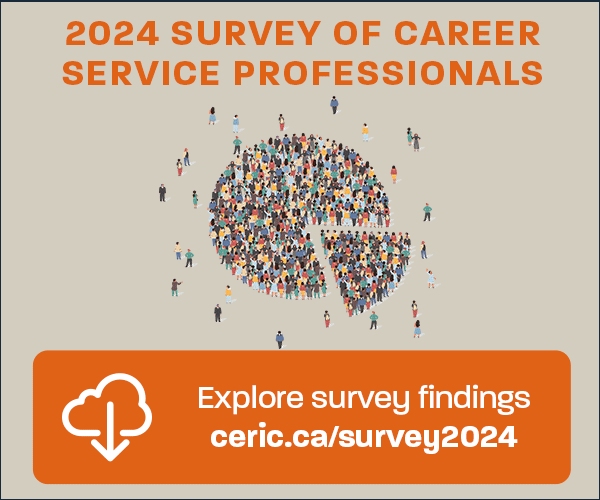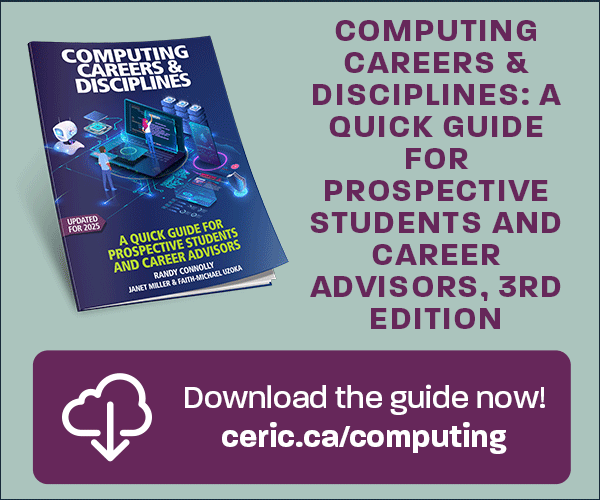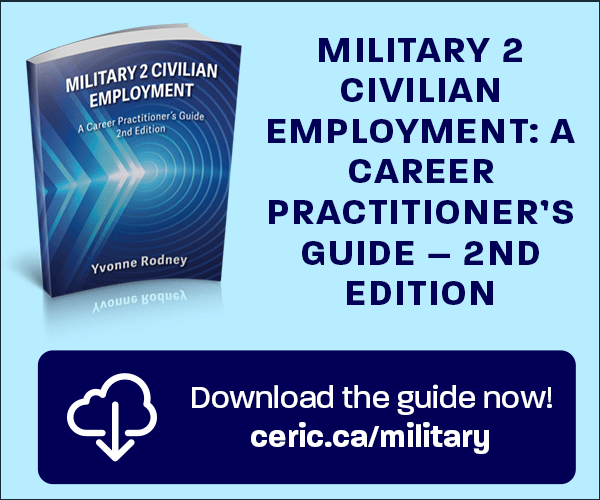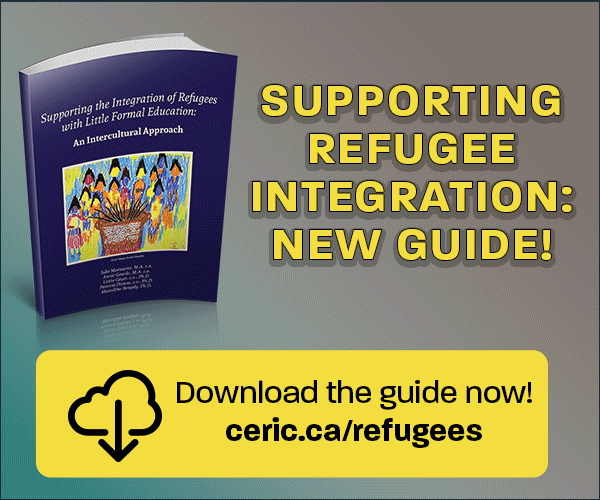A Needs Assessment of Virtual Career Practitioners
DOI:
https://doi.org/10.53379/cjcd.2022.334Keywords:
virtual service, competency, needs assesment, challengesAbstract
Like many other professionals, career development practitioners (CDPs) in British Columbia were forced to transition their services to virtual delivery at the beginning of the COVID-19 pandemic. In 2012, a BC Centre for Employment Excellence sponsored study found that among various delivery methods, virtual services were least preferred by practitioners (Neault & Pickerell, 2013). The rapid shift to virtual work in 2020, unsurprisingly, left CDPs uneasy, unprepared, and unaware of how best to move forward. This research conducted a needs assessment of CDPs through a comprehensive survey based on the new pan-Canadian competency framework (Canadian Career Development Foundation [CCDF], 2021) and nine focus groups with practitioners working with underrepresented populations in the workforce. We found a small effect of age on how difficult CDPs found the move to virtual services - older CDPs found it more difficult than younger CDPs - and numerous areas of challenge for practitioners of all demographics. This report identifies which areas and competencies of service delivery have become easier for CDPs since the move to virtual services, and which areas have become harder, supporting survey results with focus group conversations.
References
tal-health toll: How scientists are tracking a surge in depression. Nature, 590(7845), 194–195. https://doi.org/10.1038/d41586-021-00175-z
Akkermans, J., Richardson, J., & Kraimer, M. L. (2020). The COVID-190 crisis as a career shock: Implications for careers and vocational behavior. Journal of Vocational Behavior, 119, 103434. https://doi.org/10.1016/j.jvb.2020.103434
Amundson, N. E., Harris-Bowlsbey, J., & Niles, S. G. (2009). Essential elements of career counseling: Processes and techniques. Saddle River, NJ: Pearson Education.
Banks, S., Cai, T., de Jonge, E., Shears, J., Shum, M., Sobočan, A. M., Strom, K., Truell, R., Úriz, M. J., & Weinberg, M. (2020). Practising ethically during COVID-19: Social work challenges and responses. International Social Work, 63(5), 569–583. https://doi.org/10.1177%2F0020872820949614
Batastini, A. B., Paprzycki, P., Jones, A. C. T., & MacLean, N. (2021). Are videoconferenced mental and behavioral health services just as good as in-person? A meta-analysis of a fast-growing practice. Clinical Psychology Review, 83, 101944. https://doi.org/10.1016/j.cpr.2020.101944
Canadian Career Development Foundation. (2021). Competency_profile_CDP. http://ccdp-pcdc.ca/en/Competency_Profile_CDP.pdf
CERIC. (2020). 2019 Survey of Career Service Professionals: Who We Are and Where We’re Going. https://ceric.ca/wp-content/uploads/2020/02/2019-National-Survey-Findings-English.pdf
Chan, C., & Au-Yueng, H. (2021). When narrative practice suddenly goes online due to COVID-19 …. Qualitative Social Work, 20(1–2), 390–398. https://doi.org/10.1177/1473325020981086
Como, R., Hambley, L., & Domene, J. (2021). An exploration of work-life wellness and remote work during and beyond COVID-19. Canadian Journal of Career Development, 20(1), 46-56. https://cjcd-rcdc.ceric.ca/index.php/cjcd/article/view/92
Creswell, J. W., & Clark, V. L. P. (2017). Designing and conducting mixed methods research. Sage.
Fortgang, R. G., Wang, S. B., Millner, A. J., Reid-Russell, A., Beukenhorst, A. L., Kleiman, E. M., Bentley, K. H., Zuromski, K. L., Al-Suwaidi, M., Bird, S. A., Buonopane, R., DeMarco, D., Haim, A., Joyce, V. W., Kastman, E. K., Kilbury, E., Lee, H.-I. S., Mair, P., Nash, C. C., … Nock, M. K. (2021). Increase in suicidal thinking during COVID-19. Clinical Psychological Science, 9(3), 482–488. https://doi.org/10.1177%2F2167702621993857
Hames, J. L., Bell, D. J., Perez-Lima, L. M., Holm-Denoma, J. M., Rooney, T., Charles, N. E., Thompson, S. M., Mehlenbeck, R. S., Tawfik, S. H., Fondacaro, K. M., Simmons, K. T., & Hoersting, R. C. (2020). Navigating uncharted waters: Considerations for training clinics in the rapid transition to telepsychology and telesupervision during COVID-19. Journal of Psychotherapy Integration, 30(2), 348–365. https://psycnet.apa.org/doi/10.1037/int0000224
Hill, R. M., Rufino, K., Kurian, S., Saxena, J., Saxena, K., & Williams, L. (2021). Suicide ideation and attempts in a pediatric emergency department before and during COVID-19. Pediatrics, 147(3).https://pubmed.ncbi.nlm.nih.gov/33328339/
Kettunen, J., & Sampson, J. P. (2019). Challenges in implementing ICT in career services: Perspectives from career development experts. International Journal for Educational and Vocational Guidance, 19(1), 1–18. https://eric.ed.gov/?id=EJ1211572
King-Nyberg, B., Thomson, E., F., Morris-Reade, J., Taylor, C., & Borgen, R., A. (2021). A bot toolbox: An accidental case study on how to eliminate bots from your online survey. Manuscript submitted for publication.
Luken, T. (2019, October 23). Big problem in career counselling- and a possible way out. CareerWise/CERIC. https://careerwise.ceric.ca/2019/10/23/big-problems-in-career-counselling-and-a-possible-way-out/#.YemffnrMJhE
Organisation for Economic Co-operation and Development. (2020, April 28). Public employment services in the frontline for jobseekers, workers and employers. OECD. https://www.oecd.org/coronavirus/policy-responses/public-employment-services-in-the-frontline-for-employees-jobseekers-and-employers-c986ff92/
Panchal, N., Kamal, R., Cox, C., Garfield, R. (2021, February 10). The implications of COVID-19 for mental health and substance use. KFF. https://www.kff.org/coronavirus-covid-19/issue-brief/the-implications-of-covid-19-for-mental-health-and-substance-use/
Redekopp, D. E., & Huston, M. (2019). The broader aims of career development: Mental health, wellbeing and work. British Journal of Guidance & Counselling, 47(2), 246–257. https://doi.org/10.1080/03069885.2018.1513451
Sampson, J., Kettunen, J., & Vuorinen, R. (2020). The role of practitioners in helping persons make effective use of information and communication technology in career interventions. International Journal for Educational and Vocational Guidance, 20, 191–208. https://www.researchgate.net/publication/334096445_The_role_of_practitioners_in_helping_persons_make_effective_use_of_information_and_communication_technology_in_career_interventions
Schlossberg, N. K., Lunch, A. Q., & Chickering, A. W. (1989). Improving higher education environments for adults. Jossey-Bass.
Neault, R. A. (2002). Thriving in the new millennium: Career management in the changing world of work. Canadian Journal of Career Development, 1(1), 11-21.
Neault, R. A., & Pickerell, D. A. (2013). Skill requirements for BCs’ career practitioners: An exploratory study. BC Centre for Employment Excellence. https://www.cfeebc.org/skill-requirements-for-bcs-career-development-practitioners/
Walters, B., Shepard, B., & Mani, P. (2014). Developing effective client relationships. In B. Shepard & P. Mani (Eds.), Career development practice in Canada: Perspectives, principles, and professionalism (pp. 153-167). CERIC.
World Economic Forum. (2020). The future of jobs report (pp.9-35). https://www.weforum.org/reports/the-future-of-jobs-report-2020
Yukl, G. (2006). Leadership in organizations (6th ed.). Pearson Prentice.

Published
How to Cite
Issue
Section
License
Copyright (c) 2022 Canadian Journal of Career Development

This work is licensed under a Creative Commons Attribution-NonCommercial-NoDerivatives 4.0 International License.
















